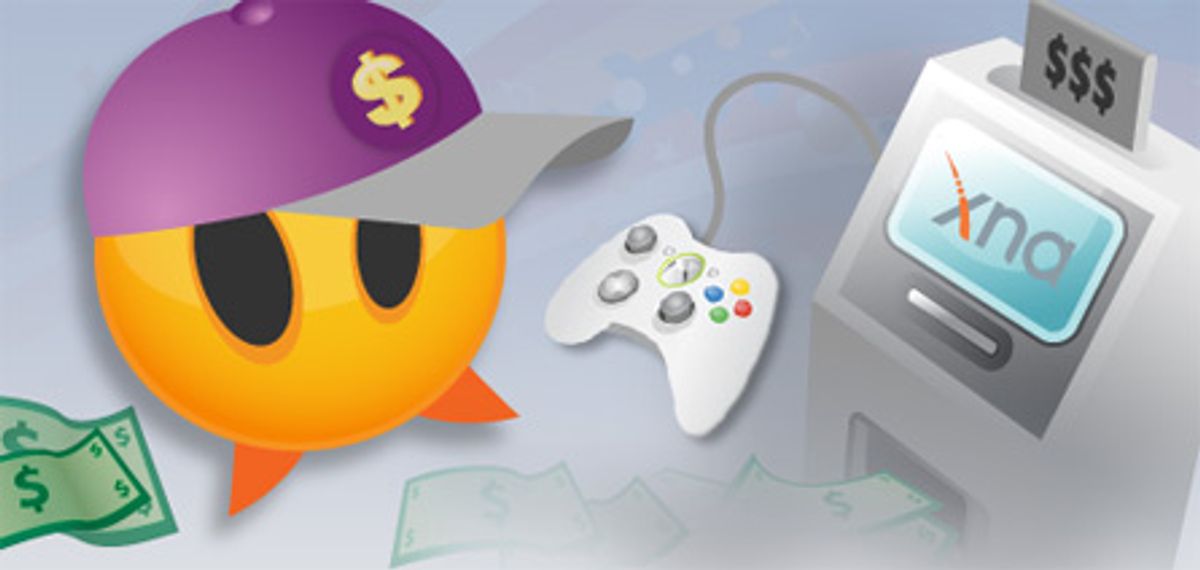
In an effort to lure more PC gamers into the Xbox Live web that binds millions of Xbox 360 users to the company's downloadable content and one another, Microsoft is dumping the $50 subscription fee it charged for Games for Windows. With just under 75 Games for Windows titles currently available, it'll be interesting to see if players who've so far resisted the online component will now "jump in," to quote Microsoft's own Xbox marketing line.
What Xbox Live subscribers are more likely to get excited about are the user-created games that will start showing up later in the year. For a $99-per-year subscription, Microsoft XNA Creator Club members will be able to sell their wares on the Xbox Live Marketplace for $2.50, $5 or $10 a pop. In return, the company will share up to 70 percent of the wealth that the games rake in.
A welcome development for creators and players alike, but what interests me even more is how long before full games will available to purchase and download, skipping the retailer and the disc altogether.
In a story about downloading video games that I wrote for the New York Times in March, I cited sales numbers provided by the NPD Group, a firm that tracks consumer purchases like video games.
Wednesday morning I contacted David Riley, a director at NPD, to get his latest thoughts on the bigger picture of full-size video game downloads.
Here's our Q&A:
J.H.: When I wrote my story, Warhawks for the PlayStation 3 was the only full-size next-gen title available for purchase and download directly to the console, bypassing the retail disc entirely. Do you see that as a one-time experiment for the time being?
D.R.: There are still a few bugs in the system, so to speak, but if you look at Xbox Originals available now on Xbox Live for download (http://www.xbox.com/en-US/games/xboxoriginals/?WT.svl=nav) you can see the basic capability is already here.
J.H.: Right, even though they aren't next-gen games they, like Warhawks, demonstrate that you can download a full game to the hard disk. Which brings up the issue of storage.
D.R.: Of course. Hard drive space isn't unlimited. I believe the most hard drive capacity currently available on the high end ranges from 80 GB to 120 GB. Once you take into account the amount of content many gamers may already have on their systems' hard drives (videos, music, SD and HD movies, games), even 120 GB doesn't seem like it would be enough to satiate their appetites for downloadable premium titles.
J.H.: On my Xbox 360 I can re-download purchased games or add-ons that I may have deleted to free up space. Won't that do?
D.R.: Yeah, I do realize that you can delete and re-download whenever you want but there's a psychological barrier to overcome when you're talking about purchasing titles at a premium price. Many consumers prefer to have the physical product over the digital one. However, I remember when many were saying digital music would never replace physical CDs and look where we are today, so there's no doubt in my mind that gaming consumers will also adopt the digital format once it's been perfected.
J.H.: So you do see full-size game downloads happening?
D.R.: Not so fast. Looking beyond the technological issues, there are several barriers to overcome before we start seeing a multitude of next-gen titles being offered via download on current-generation video game consoles. I don't want to delve too deeply into this, but the pricing structure for new high-end titles would play a big role in the psyche of the consumer. There's an obvious difference between a 99-cent song on iTunes and a $40 or higher video game title that would be available for downloading.
J.H.: We're back to that psychological barrier, which from your POV is so strong it sounds like you're saying full-size title downloads have a snowball's chance in hell ...?
D.R.: Who knows, but I'd be cautious. Of course, I'm 40 years old, so I'm old school.
J.H.: I've got you beat by four years and I'm fine with saying goodbye to the disc. But something I can do with a disc and not a download is trade it in after I've finished the game or get bored with it. I'd be cool with deleting a purchased download and giving up the rights to download it again in exchange for a partial credit to apply to a new download. Half would be great, though I'd even be fine with a quarter of the value. Think that'd fly?
D.R: Used games are directly related to physical product in retail. It's a cash cow now, but I see no way it could survive at its current level with mass adoption of downloadable digital content.
J.H.: Which, for video games anyway, isn't likely to happen overnight.
D.R.: On the business end, it's a real juggling act that would require a lot of business communications prowess on the part of publishers and manufacturers alike, especially when it comes to relationships with their channel partners. All parties would need to find common ground in order for this to work in everyone's favor.
J.H.: And we all know how long finding common ground can take in this business. Speaking of which, thanks for taking the time to have this conversation.
I welcome your thoughts and comments on the present state and future possibilities of downloading video games.



Shares